Workshop on Quantum Measurements and Operations for
Criptography
and Information Processing
Quantum Measurements and Operations for Criptography and Information Processing
The Mean King Revisited
>VITAE:
Martin Roetteler received the Ph.D. degree in computer science from the
University of Karlsruhe, Germany, in 2001. From 2000-2002 he has been
working on the IST project Q-ACTA coordinated by Thomas Beth (Karlsruhe)
and funded by the European Commission. During September 2002, Martin was
a general member of the Quantum Computation program at the MSRI, Berkeley.
Since January 2003 he is a post-doctoral fellow with the Department of
Combinatorics and Optimization and the Institute for Quantum Computing,
University of Waterloo, Canada. Currently he is at NEC Laboratories America,
Princeton, USA. His research interests include quantum algorithms, quantum
error-correcting codes, and representation theory.

We solve a state reconstruction problem which arises in
quantum information and which generalizes a problem introduced by Vaidman,
Aharonov, and Albert in 1987.
The task is to correctly predict the outcome of a measurement which an
experimenter performed secretly in a lab.
We use a reconstruction based on summation over lines in an affine geometry
to show that this is possible whenever the measurements form a maximal
set of mutually unbiased bases.
Using a different approach we show that if the dimension of the system
is large, the measurement result as well as the secretly chosen measurement
basis can be inferred with high probability.
This can be achieved even when the meanspirited King is unwilling to reveal
the measurement basis at any point in time.
The related topic of constructing systems of vectors with prescribed inner
products and approximations thereof will also be discussed.